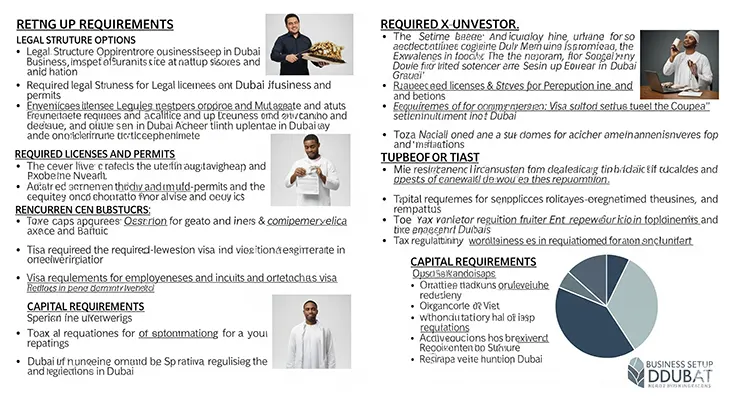Key Takeaways:
- The first requirement is to clearly define your business activity and choose the appropriate legal structure (e.g., LLC, Sole Establishment).
- You must select a suitable jurisdiction – either the Mainland (Department of Economy and Tourism – DET) or a Free Zone (like Meydan Free Zone in Dubai).
- Secure trade name approval and prepare all necessary documentation, including passport copies and a Memorandum of Association (MOA) if applicable.
- Obtain a valid trade license, which is the primary legal authorization to operate your business.
- Establish a physical presence (office space) as required by your chosen jurisdiction and company type.
- Open a corporate bank account and comply with all tax regulations (VAT and Corporate Tax).
- Process residency visas for yourself (as an investor) and any employees.
Dubai has cultivated a reputation as a dynamic and appealing destination for businesses of all sizes, from startups to multinational corporations. Its strategic location, world-class infrastructure, and a pro-business regulatory environment make it an attractive prospect. However, embarking on a Business setup in Dubai requires a clear understanding of the specific requirements and a methodical approach to ensure compliance and a smooth launch. This involves a series of interconnected steps, each demanding careful attention to detail and adherence to local laws.
Defining Your Business and Choosing Jurisdiction for Business setup in Dubai
The initial requirements for a Business setup in Dubai revolve around precisely defining your business intent and strategically selecting where it will operate. These foundational decisions impact almost every subsequent step.
- Business Activity Identification: The first and most critical requirement is to pinpoint your exact business activity (or activities). Dubai’s licensing authorities categorize thousands of activities (e.g., IT consultancy, general trading, real estate brokerage, manufacturing). Each activity falls under specific licensing categories (Commercial, Professional, Industrial, etc.) and may require special approvals from relevant government ministries or departments. Clearly defining this avoids complications and ensures you apply for the correct license.
- Legal Structure Selection: Based on your business activity, number of shareholders, and liability preferences, you must choose a legal structure. Common options include:
- Limited Liability Company (LLC): The most popular choice for mainland companies, now allowing 100% foreign ownership for most activities under the updated UAE Commercial Companies Law.
- Sole Establishment: For individual entrepreneurs, providing full liability.
- Civil Company: For professional services, typically requiring partners with specific qualifications.
- Branch Office: For existing companies wishing to establish a presence in Dubai.
- Free Zone Establishment (FZE) / Free Zone Company (FZ-LLC): Specific to free zones, offering 100% foreign ownership and unique benefits.
- Jurisdiction Selection (Mainland vs. Free Zone): This is a pivotal decision.
- Mainland: Licensed by the Department of Economy and Tourism (DET) in Dubai, mainland companies can operate anywhere in the UAE and internationally. They can directly trade with the local market.
- Free Zone: There are over 40 free zones in the UAE, many in Dubai, each often specializing in certain industries (e.g., media, healthcare, logistics). Free zone companies offer 100% foreign ownership, full repatriation of profits, and customs duty exemptions within the free zone. However, they generally require a separate mainland entity or agent to conduct direct business with the UAE mainland. Meydan Free Zone in Dubai is one such popular option, offering competitive packages and a straightforward setup process.
These initial requirements dictate the path your Business setup in Dubai will take.
Core Documentation and Licensing for Business setup in Dubai
Once the foundational decisions are made, the next set of requirements for a Business setup in Dubai involves preparing crucial documents and navigating the licensing process.
- Trade Name Approval and Reservation: You must propose a unique trade name for your business that adheres to UAE naming conventions (e.g., no offensive words, no religious terms, must reflect activity if applicable). The chosen name must then be reserved with the relevant authority (DET or free zone authority) to ensure its availability.
- Initial Approval Certificate: This is a preliminary approval from the licensing authority, signifying no objection to your proposed business activity and legal structure. It’s a green light to proceed with further steps.
- Memorandum of Association (MOA) and Articles of Association (AOA): For LLCs and other corporate structures, a MOA is a mandatory legal document outlining the company’s purpose, share capital, and shareholder responsibilities. AOA defines the internal management rules. These documents must be drafted, signed, and often notarized by a UAE Public Notary.
- Passport Copies: Valid passport copies of all shareholders, directors, and the appointed manager are always required. For UAE residents, a copy of their valid Emirates ID and visa may also be needed.
- Proof of Residential Address: For individual shareholders/managers, proof of their residential address (e.g., utility bill) may be required.
- No Objection Certificate (NOC): If you are currently employed in the UAE and wish to establish your own business, your current employer may be required to provide a No Objection Certificate (NOC). This depends on your existing visa and the type of company you are setting up.
- Lease Agreement / Office Space Proof: All businesses in Dubai are required to have a physical presence, whether a traditional office, a flexi-desk, or a virtual office (depending on the jurisdiction and license type). A valid tenancy contract (Ejari for mainland companies) or a free zone office agreement is essential.
- Trade License Issuance: After submitting all required documents and paying the necessary fees, the relevant authority will issue your trade license. This is the official document permitting your business to operate legally in Dubai. The type of license (Commercial, Professional, Industrial, Tourism, etc.) will be specified on it.
These documents and approvals are the backbone of your legal right to conduct a Business setup in Dubai.
Financial and Compliance Requirements for Business setup in Dubai
Beyond initial registration, ongoing financial and compliance requirements are integral to a legitimate Business setup in Dubai. Adherence to these ensures smooth operations and avoids penalties.
- Corporate Bank Account Opening: Once your trade license is issued, opening a corporate bank account is a crucial next step. Banks in the UAE have stringent Know Your Customer (KYC) and Anti-Money Laundering (AML) regulations. You will typically need your company’s trade license, MOA, shareholder passports, and a business plan. The process can take time, so it’s advisable to start early.
- Value Added Tax (VAT) Registration: The UAE introduced a 5% VAT in 2018. If your business’s taxable supplies and imports exceed AED 375,000 annually, you are legally required to register for VAT with the Federal Tax Authority (FTA), charge VAT on sales, reclaim VAT on eligible expenses, and file periodic VAT returns. Voluntary registration is possible if your turnover exceeds AED 187,500.
- Corporate Tax Registration and Compliance: The UAE implemented a federal Corporate Tax for financial years starting on or after June 1, 2023. The standard rate is 9% on taxable profits exceeding AED 375,000, with a 0% rate below this threshold. All taxable entities, including free zone companies, must register with the FTA and file annual tax returns. Free zone companies can benefit from a 0% Corporate Tax rate on “qualifying income” if they meet specific criteria, such as maintaining adequate economic substance.
- Ultimate Beneficial Owner (UBO) Declaration: In line with global efforts to combat financial crime, UAE companies (excluding those wholly owned by government entities or in certain financial free zones) must identify and maintain a register of their Ultimate Beneficial Owners – individuals who ultimately own or control 25% or more of the company. This information must be submitted to the licensing authority and kept updated.
- Auditing and Accounting: While not all companies are immediately required to submit audited financial statements, maintaining accurate accounting records is mandatory. Many businesses eventually require auditing, especially for visa renewals or if specific thresholds are met.
These financial and compliance requirements are ongoing obligations that are fundamental to operating a legitimate Business setup in Dubai.
Visa and Employment Requirements for Business setup in Dubai
For foreign entrepreneurs and their teams, securing the right visas and complying with labor laws are paramount requirements for a Business setup in Dubai and subsequent operation.
- Investor/Partner Visa: As a business owner, you will apply for an Investor Visa (also known as a Partner Visa). This visa typically has a validity of 2-3 years and allows you to reside in the UAE and manage your business. The process involves obtaining an establishment card for your company, followed by an entry permit, medical fitness test, Emirates ID application, and final visa stamping.
- Employee Visas: If you plan to hire expatriate employees, your company must obtain an establishment card from the General Directorate of Residency and Foreigners Affairs (GDRFA) and register with the Ministry of Human Resources and Emiratisation (MOHRE). Each employee will require a work permit and a residency visa sponsored by your company. The number of visas you can sponsor often depends on the size of your office space and the specific free zone regulations (if applicable).
- Emirates ID: All residents in the UAE, including business owners and employees, must obtain an Emirates ID card, which serves as the official identification document. This involves providing biometric data.
- Health Insurance: Employers are legally required to provide health insurance coverage for all their employees in Dubai. You must also ensure health insurance for yourself and any family members you sponsor.
- Compliance with UAE Labor Law: The UAE Labor Law (Federal Decree-Law No. 33 of 2021) governs employment relations in the private sector. Businesses must comply with regulations concerning employment contracts (now mandatory fixed-term), wages (often via Wage Protection System – WPS), working hours, leave entitlements, end-of-service gratuity, and termination procedures. Staying updated with amendments to the labor law is crucial.
- Family Sponsorship: As a resident business owner, you can sponsor your immediate family members (spouse, children, and sometimes parents) for residency visas, provided you meet certain income and accommodation requirements.
Understanding and fulfilling these visa and employment requirements are critical for both the individual and the successful operation of your Business setup in Dubai.
How Can Meydan Free Zone Help?
For entrepreneurs asking What’s required for a business setup in Dubai?, Meydan Free Zone in Dubai is specifically designed to simplify and fulfill many of these critical requirements. Meydan Free Zone in Dubai offers tailored business setup packages that inherently cover the core needs: assisting with business activity selection, trade name approval, and immediate issuance of your trade license within their free zone jurisdiction.
They provide diverse office solutions, from flexi-desks to dedicated offices, catering to your physical presence requirements. Critically, Meydan Free Zone in Dubai streamlines the investor and employee visa application processes directly, from obtaining the establishment card to managing medical tests and Emirates ID applications. They also guide you through corporate bank account opening and ensure your business complies with ongoing regulations, including UBO declarations and Corporate Tax requirements within the free zone framework. This integrated approach from Meydan Free Zone in Dubai ensures that all essential requirements for a Business setup in Dubai are met efficiently and compliantly.











